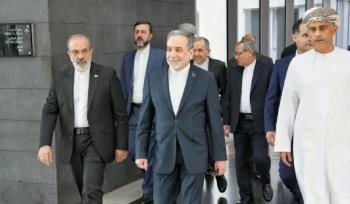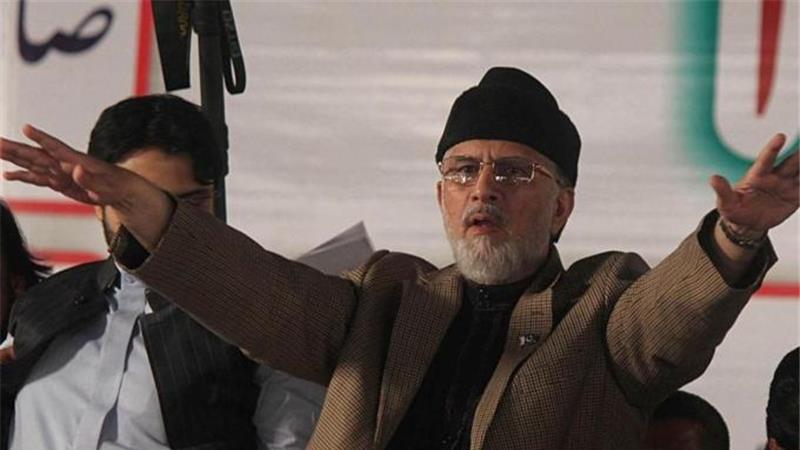Alwaght- In the beginning of 2013 and towards the end of 2014, Tahir ul-Qadri led the anti-government protests. He stated that by these starting protests, he was aiming to carry out a revolution in Pakistan. After a few months of sit-ins and marches, in September of 2014 he traveled to London, and after that returned to Canada.
Once again ul-Qadri has come to Pakistan, and is currently leading the Qisas Movement. The supporters of Awami Tahreek party have marched the streets in cities of Multan, Lahore, Rawalpindi, Karachi and Quetta. These protests started in August 27, 2016, and are led by ul-Qadri himself. Tahir ul-Qadri has stated that these massive protests will continue against the policies of the central government of Pakistan. These protests, which have been named the Qisas Movement, are taking place to declare opposition against government policies, and avenge those who were killed two years ago in Lahore. It should be noted that during Tahir ul-Qadri’s return to Pakistan in 2014, the government of Nawaz Sharif did not allow the aircraft to land, and it was forced to return to Lahore. During the massive protests of Qadri’s supporters against the government, more than 14 people were killed and dozens were injured by government security forces. In support of those who were killed, and to protest the government policies and spread of corruption and poverty, Tahir ul-Qadri started the Qisas Movement. It has been speculated that Qadri’s protests will continue in other forms in the future. It is not clear why Tahir ul-Qadri rallied his supporters against the government, and after a while moved to UK and Canada. It is a fact that no protest starts in Pakistan, unless it is supported by internal powers such as the military, Pakistani Government, and powerful political parties.
Qisas Movement has been speaking about the incompetence of government, and starting a revolution, but behind the scenes, the movement is associated with the Pakistan Army. This is why after Nawaz Sharif government and the army came to an agreement in the autumn of 2014, Tahir ul-Qadri left the revolution unfinished, and returned to Canada. In order to control people’s parties and the Muslim League, the army aims to create a Third Position. Tahir ul-Qadri’s movement and a coalition of small parties that are associated with the army, could be present in the structure of power, which will help the army in achieving its goals.
Tahir ul-Qadri, during the rule of Gen. Pervez Musharraf in Pakistan, was one of the first big figures that stated the coup was necessary. He also declared that political parties are inefficient and corrupt, and hailed General Musharraf as Pakistan’s savior. At the same time, many domestic political experts in Pakistan spoke of a possible link between Minhaj-ul-Quran and army generals, and this suspicion still exists. It has been said that Minhaj-ul-Quran and Dr. Qadri himself are part of army’s playing cards and projects, so that in times of need, they can advance army’s goals without the need of a coup or direct involvement of the army. The activities of ul-Qadri after his return from Canada have raised doubts about the affiliation and association of some army generals, especially the LSI leaders, with Tahir ul-Qadri’s movement. One of these activities was starting the famous 350 km march from Lahore to Islamabad, and sitting-in and protesting in order to overthrow the Muslim League government and Nawaz Sharif, who was in fierce competition with army generals, for power.
However, for many reasons after about 100 to 150 thousand people, paralyzed the capital Islamabad, the protests ended in a compromise between the government and Tahir ul-Qadri, and in the end he returned to Lahore and then Canada. The reasons that led to the failure of theses protests were as follows: Other political parties did not support Qadri’s movement, ul-Qadri was expecting four million people to show up and support him in Islamabad but only 100 to 150 thousand people showed up, and his plan in forcibly taking control of government departments and sensitive areas, failed.
Before the 2013 protests, there were conflicts between army generals -especially the ISI- and the Nawaz Sharif government. Even now, the government and powerful army generals have differences of opinions in the following subjects:
1. The approach towards India
2. Dealing with developments in Afghanistan and the peace talk between the Taliban and the central government of Afghanistan
Since the internal and external situation is not in favor of a coup attempt, the army is not in a position to overthrow the government through coup. Although the military has raised their credibility in public opinion by fighting with radical Islamic groups in North Waziristan, but the army is still being accused by the US for a dual policy, in which the army supposedly is fighting against a section of extremist group while supporting another section of extremists at the same time. Currently the US has stopped supporting the army and the tensions between the government and some army generals has risen. It is in this situation that Tahir ul-Qadri and Minhaj-ul-Quran have become active again. It has been speculated that Qadri will continue to work with the same supposed objectives of fighting with corruption, removing the process of early elections, and military intervention for saving the country.
In this regard there are discussions about a new military project in Pakistan which is known with as the Third Way. In fact the Third Way is a solution that can be extracted from the military and political conflicts that are centered on Muslim League party. Meaning that al-Qadri, Minhaj-ul-Quran, Imran Khan and PTI(Tehreek-e-Insaf) should be at the center of focus, and the military should bring the supporters of smaller parties together, and lean important figures from Peoples Party and Muslim League, towards separation and breakup of these parties, in order to pave the way for Third Way to succeed in the upcoming elections.
Qadri will probably organize his second wave protests and marches from Lahore to Islamabad with the abovementioned goals in mind. Also, he will most likely be supported from behind the scenes. But still, it is not clear if these activities will result in him being successful in starting an all-out revolution. Especially since two powerful parties of Peoples and Muslim League have agreed to set aside their differences and help the Nawaz Sharif government to finish its 5-year statutory period. If this happens, the Nawaz Sharif government will be the second government after Peoples Party that finished its 5-year statutory period. On the other hand, an action by Nawaz Sharif has frightened the army generals in moving towards taking the power. This action was the announcement that declared Gen. Raheel Sharif will be promoted to the 5 star general rank after his retirement. Prior to this, this rank was only given to Gen. Yaqub Khan.
However, it is not clear if these actions and precautions will affect the Third Way project. Main political parties, and Nawaz Sharif himself hope that the government is able to survive the crisis that Tahir ul-Qadri is about to start.



























